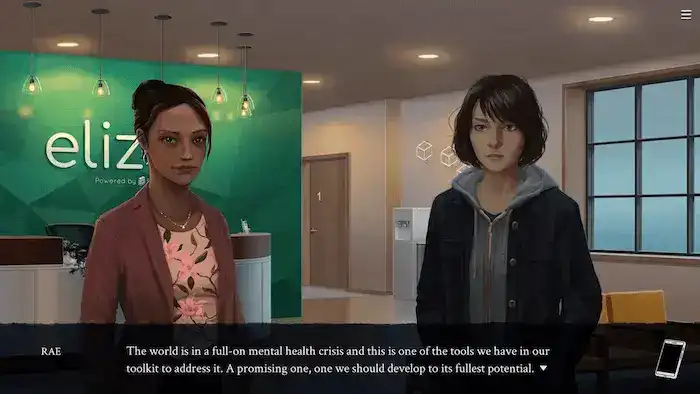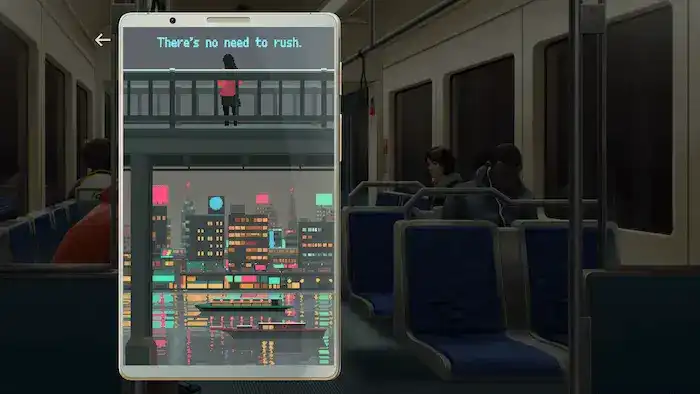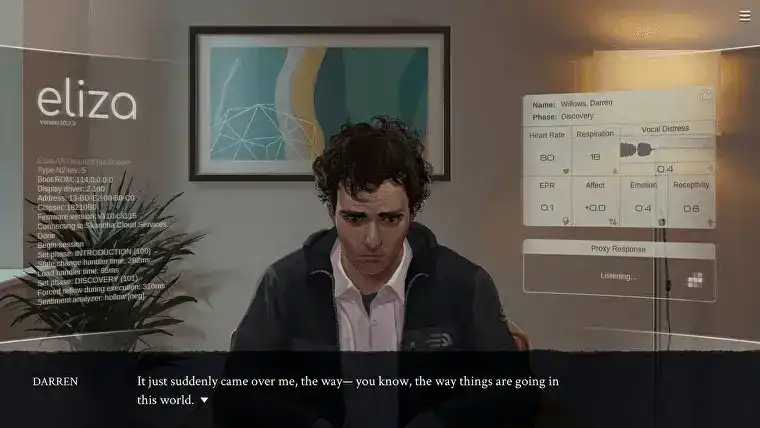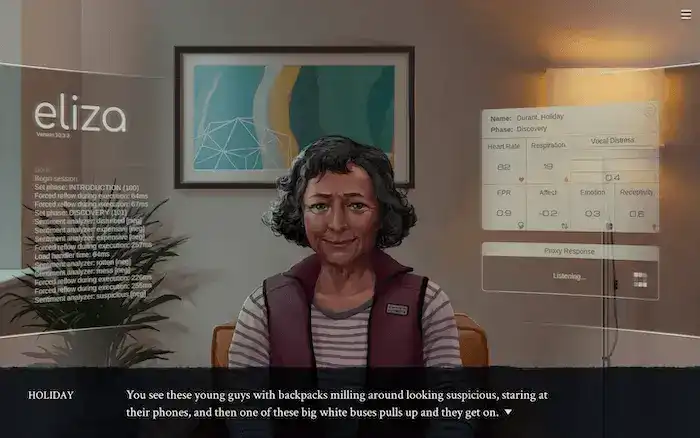As you begin Eliza, developed by Zachtronics, you're greeted with the Monday morning blues on a dreary commute in a silent Seattle subway. The protagonist Evelyn checks her phone and observes the people around her as she heads to her first day at her new job, which remains a mystery until you get there.
There's a scene that would be startlingly familiar to anyone living in an urban city: Everyone on the subway is in their own bubble, unsurprisingly using some form of technology or staring out a window.
Throughout the game, I was continuously surprised by the accuracy of the setting and even moreso by the sounds, colors, and dialogue that captured the essence of how it feels to be a weary-eyed adult in a big city overtaken by tech — an environment I know all too well as a tech worker in an urban city.
Once you arrive at your destination, you step into a bright, well-lit tech office with bold colors — a stark contrast with the dull blues and grays of the subway and the city, yet another accurate picture of life in the tech industry.
You meet the supervisor Rae, a firm believer in technology's ability to change lives for the better, one among many believers who bring such a perspective. Along the way, you'll also meet those with the beliefs that they can create something even better than what exists and is less harmful to humanity, those who are overly hungry for data and are impossibly ambitious, and those who want nothing to do with any of it.
Listener or Data Collector?
The office you step into is Eliza's. Eliza, named after and architected by Evelyn, offers itself as a program who "listens" and asks questions to help the patient reflect on themselves, their lives, and digs deeper into why they feel the way they do. In reality, it doesn't do much more than ask the same three questions every time and offer drugs as a solution, all the while collecting immense amounts of private data about everyone it talks to.
The person piloting Eliza, called the proxy is only there to make it seem as if the patients are talking to someone human. In this case, the proxy is the protagonist Evelyn, who has been absent from the world after a mysterious event occurred in the past. In between sessions, you can play games and check email and texts on your phone, just as you likely would in real life.
The Harsh Reality
This game really hit home for me because it was as if it was speaking my mind. In the months prior to my playthrough, I felt like a zombie trudging to work in a cold, tech-filled, concrete jungle.
The world of Eliza easily reflects this reality many urbanites live with, while also debating on the benefits, dangers, and ethics of high tech and personal data collection. Looking around and speaking to people in a world where the AI counseling program Eliza exists reminded me starkly of my own life.
When piloting Eliza to talk to patients who just need someone to truly listen to them, it immediately became painfully clear how dissociated and generic Eliza is for how much its touted by executives of the company as the solution to the world's mental well-being. Yet, it was still smart enough able to account for explosive patients that demanded to talk to the human behind the screen and calm them down.
Though the proxy is present during the Eliza therapy sessions, the human is just a delivery vehicle to advance the program Eliza and the company executives' goals. The proxy cannot veer off the screen's script lest they get locked out of the program and subsequently fired.
At times, it's hard to stick to the script when you have the option to say something more meaningful and empathetic rather than just asking questions along the lines of "and why do you feel that way?" over and over again, especially when these problems are very real and very relatable.
This part feels heart-wrenching as you are forced to answer the way Eliza wants you to, albeit realizing no AI can replace genuine human interaction and active listening. But this is all the people want when they seek out Eliza. Evelyn wrestles with the fact that her creation is not achieving what it was originally meant for in the beginning.
Is There Really a Choice?
The ending is less than satisfying and frankly quite anti-climatic after all this build up, but that's a closer reflection of the reality of life. The last choice is really the only one that matters since the other choices don't affect the story whatsoever and merely tweak the dialogue in some interactions. This is a point that really weakens the game in spite of its extremely relevant story and unique concept that makes it worth playing.
Warning: ending outcome spoilers in this section. To skip, scroll ahead to the next section.
In the end, you are able to choose between four paths that you've had a chance to thoroughly glimpse while navigating life as Evelyn.
You can continue your career in tech by rejoining the Eliza mission or by joining a new startup. Another option is to be somewhere outside the heart of the industry, but still within a tech office, where you could continue piloting Eliza while earning a psychology degree to become a true therapist. However, if you want to completely fall off the radar, a former coworker and close friend offers you a chance to pursue a new passion for music.
It feels as if there should be more of a choice than either being absorbed by the system again and working on producing more tech or feigning ignorance and doing something else while you know tech executives continue to tighten their grasp on the world.
However, this is pretty close to the truth of our society. We can't expect Evelyn to change the world as she knows it with her last choice and dismantle the system thriving on the presence of high technology her world is so heavily reliant on. She can only take small steps to either lead it in the right direction, help people who are affected, or ignore it altogether — the same kind of choice we all make every day.
It Is Your Decision
The perspectives of those we meet along the way in the world of Eliza encourage us to reflect on the state our own world and the choices we make in our lives that determine the path technology will take. It is on us to deeply ponder if the decisions we make are the right ones for humanity, just as Evelyn did.
Although some loose ends including those around the ethics of personal data collection and the fate of a few other characters could have been tied up better in the endings, it is still worth a play. Just make sure to check out the other endings if you get a particularly disappointing one.
I recommend this to anyone who has thought at all about how technology has affected the state of humanity, and especially to those who work in the tech industry as I do. It's worth a playthrough if you yearn for both relatable and differing perspectives on technology and a world that reflects your own reality back at you for deeper thought.




